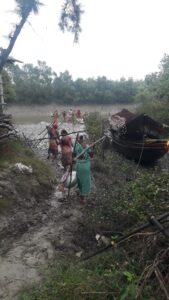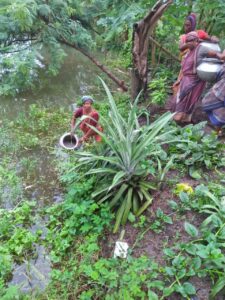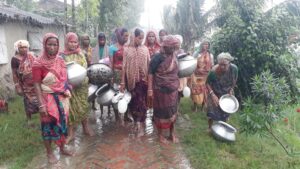

Mukti is Creating Job opportunities by Collecting Fries and Fingerlings for the People of Sunderban
Mukti was established for the development of Sundarbans area and to provide the service for the poor people and villagers who are residing in critical situation where most of them are suffering and struggling for their livelihood and try to make their earnings with some local product like honey collection, fishing, wood cutting, cultivation etc.
“Food for Work” is an important initiative of Mukti to create job opportunities for the needy residents of Sunderban. Through this project Mukti has appointed thousands of people and helped number of households to continue their livelihood.
Mukti has launched a job opening for the women of Mukti model village at Purba Sridharpur. The job will be involved collecting fries and fingerlings. A brief narration about the project is stated under:
Shootnet (Meen jal):
 This is a long, funnel-shaped bag net set against the tidal current to filter seed from estuarine water. The size of the net is highly variable and there are various modifications, depending on the nature’ of terrain and areas to be covered. The material used for the net is nylon monofilament of 1mm mesh. The “Gamcha” (coarse cloth), which is used to collect carp fry, is no more used. The general specifications of the net are: Width-40m-60m, Length-50m-75m and Height- 3m, with a tapering end 3m in diameter. Shrimp fry-collectors make a knot at the tail end of the shootnet. The contents from the tail end are periodically emptied into an aluminum utensil by turning upside down.
This is a long, funnel-shaped bag net set against the tidal current to filter seed from estuarine water. The size of the net is highly variable and there are various modifications, depending on the nature’ of terrain and areas to be covered. The material used for the net is nylon monofilament of 1mm mesh. The “Gamcha” (coarse cloth), which is used to collect carp fry, is no more used. The general specifications of the net are: Width-40m-60m, Length-50m-75m and Height- 3m, with a tapering end 3m in diameter. Shrimp fry-collectors make a knot at the tail end of the shootnet. The contents from the tail end are periodically emptied into an aluminum utensil by turning upside down.
The nets are operated in waist-to-chest-deep water. With the rise of the water level, the horizontal bamboo is adjusted and the net is soaked for further collections. This process is repeated till the tidal current becomes feeble and collections are no longer possible. Fixing the shootnet in reverse direction, fry can be collected during ebb tide, when the velocity of the water is sufficient to keep the net in position. This type of net operation is common and a series of shootnets are operated all along the shore line for collection of fries and fingerlings.
Collection method in tidal creeks and canals

In tidal creeks/canals, 20-25 types of fingerlings and fries (meen) such as Khoraj Chingri, Bagda Chingri, Bhetki, Parse etc are collected using a shootnet with two bamboo poles. One or two persons are required for each unit. Just after the beginning (30-45 minutes) of high tide, the women engaged at this task starts collecting the fingerlings when the water flows about 2-2.5 feet high .Then, the conical-shaped shootnets are tied to the bamboo poles by means of rope. The free tail end of the net is allowed to drift against the current and gets stretched. The fry accumulated at this end are removed by turning upside down, generally every 30 minutes. In this method of collection, both bamboo poles are shifted towards shore with the gradual rise of water. The nets are accordingly adjusted. For low tide collections, a similar method is followed, but the net is fixed with the bamboo poles in the reverse direction. With the gradual fall of the water level, the bamboo poles are shifted towards the deeper zones and collection continued as long as the water current is adequate to keep the net in shape.
From shootnet collection made along the ponds and canals of Purba Sridharpur:

The entire fry accumulated in the shootnets are removed periodically by emptying contents into large, wide-mouthed aluminum” hundis” containing water. After collecting those fries and fingerlings in hundis they are distributed to the 3 ponds of Mukti model village, Government owned canal, named Pipremari and 500 hector farming land owned by Government. Every day 45 -50 hundis of fingerlings has been distributed.
How Mukti has created Job opportunities for the local women

15-20 women of Mukti model village are engaged in collection of the fries and fingerlings. For example when 15 women are busy in collection other 5 are engaged in sorting. It’s a 10 days program started from 24th August, 20. Being a laborious job it requires 3-3 ½ hours a day. Under the “Food for Work” project Mukti is providing dry ration costing Rs. 150 per day to all these women.
[gdlr_button href=”http://localhost/mukti-old/product/donate-amphan” target=”_self” size=”medium” background= “#FF0000″ color=”#ffffff”] Donate Now! [/gdlr_button]
Project Activities
- A village for independent and enterprising women (A VIEW) (5)
- About Mukti (4)
- Accreditation (14)
- AGM (63)
- Agriculture Reforms (122)
- Ambulance Service (2)
- Amplifying Community Voices (61)
- Awards (14)
- Awareness and Empowerment (127)
- Awareness drives (51)
- Bio-Village-Kankandighi (10)
- Careers (4)
- Chick Rearing Programme for Marginalised Women (16)
- CHILD (5)
- Climate Resilience River Embankment (46)
- Covid-19 (74)
- Cultural Shows (7)
- Cyclone Aila (12)
- Cyclone Aila (1)
- Cyclone Amphan (44)
- Cyclone Bulbul (30)
- Cyclone Dana (3)
- Cyclone Remal (12)
- Cyclone Response & Recovery (90)
- Cyclone Tolerant Houses (15)
- Cyclone Yaas (57)
- Disaster Recovery (263)
- Editorial (47)
- Editorial by Abir Biswas (1)
- Editorial by Amit Kumar Dey (2)
- Editorial by Ananya Chatterjee (1)
- Editorial by Ankita Kothiyal (3)
- Editorial by Debabrata Halder (1)
- Editorial by Dr. Alokananda Ghosh Sengupta (2)
- Editorial by Kasturi Bakshi (1)
- Editorial by Monami Mitra (1)
- Editorial by Nandita (2)
- Editorial by Pampa Karmakar (1)
- Editorial by Pranay Patra (1)
- Editorial by Prof. Pradeep Ray (1)
- Editorial by Ranitendranath Tagore (1)
- Editorial by Sankar Halder (14)
- Editorial by Satyajit Ray (7)
- Editorial by Sohini Mehta (1)
- Editorial by Sonamon Basu (2)
- Editorial by Soumitra Bose (1)
- Editorial by Subhankar Basu (1)
- Editorial by Supriyo Banerjee (1)
- Editorial by Ujjwal Maity (1)
- Education and Enrichment (388)
- Environment and Resilience (125)
- Featured Activities (20)
- Gram Clinic (9)
- Health Water & Sanitation (91)
- HOPE (10)
- Impact Stories List (110)
- Integrated Development (195)
- International Management Institute (IMI) (2)
- Jal hi Kal (6)
- Kitchen Gardening (16)
- Livelihood & Enablement (214)
- MCDF (119)
- Medical Camp (44)
- MIT (9)
- MKSS (42)
- MSS (138)
- Mukti Academia (5)
- Mukti Academy (2)
- Mukti Craft (17)
- Mukti Cultural (2)
- Mukti Employment Exchange (MEE) (9)
- Mukti Fresh (15)
- Mukti Gram - Egra (10)
- Mukti Gram - Purbashridharpur (169)
- Mukti Green Defense in Sundarbans (11)
- Mukti Yoga (12)
- Mukto Dhara (2)
- Northumbria University (2)
- Obituary (6)
- Observance Days Celebration (53)
- Organic Farming & Training Support (44)
- Pond Rejuvenation (20)
- Prerna (4)
- Projects For Mukti Wide (3)
- Queen Mary University of London (1)
- Rights and Special Needs (107)
- Run for Cause (13)
- Run4SafeFood (3)
- SDF (6)
- Shahoshini (9)
- Skill & Enterprise Development (21)
- Smart lab (5)
- Social Stock Exchange (2)
- Social Workers' Convention (1)
- Sundarbans Green (SUN-G) (15)
- Sunderban development fair project (4)
- Surya (7)
- Sustainable Agriculture Movement (62)
- SWAS-2-0 (14)
- SwasthoSongini (28)
- Swavalamban Accelerator in Sundarbans (SWAS) (21)
- Tour for Cause (45)
- TSS (186)
- UDAAN (5)
- Uncategorized (96)
- University of Calcutta (1)
- Value Education (12)
- Valued Partners (3)
- Vocational Trainings (15)
- VOICE (14)